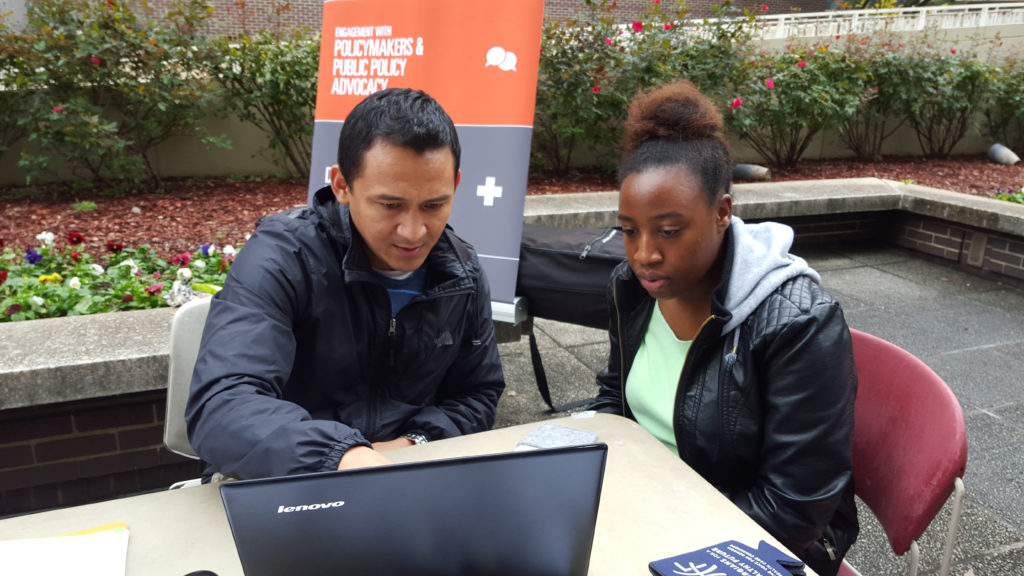Many state Medicaid systems today are a patchwork of vendors and capabilities not designed to pull and track data from disparate sources — a capability at the core of tracking…
Blog
Legislative update: Week 4
| The GHF team loves bringing you these weekly legislative updates, and you have told us that you enjoy reading them! Our team works hard to deliver this service to you in a complete and accurate way every week of Georgia’s legislative session. If you rely on these updates to keep you connected to the health happenings under the Gold Dome, please consider supporting our work with a donation today. Thank you very much! |
In this week’s update:

- New bill on network adequacy!
- Budget updates
- New legislation on tobacco, vaping, and moving to a state-run ACA marketplace
- Advocacy events for your calendar
- GHF’s got you covered this session!
ENSURING GEORGIANS ACCESS TO QUALITY HEALTH CARE!
The CATCH Act aims to protect Georgians from high health care costs

SB 20 has been introduced by Sen. Kay Kirkpatrick and is titled the Consumer Access to Contracted Healthcare (CATCH) Act. The CATCH Act revises Georgia’s Surprise Billing legislation to set network adequacy standards for insurers and provides protections for when consumers are forced to go out of a health plan’s network of providers for care.
Network adequacy measures a health plan’s ability to deliver reasonable and timely access to the health care services needed by their members. This includes primary care, specialty, and mental health providers. In order for health plans to have adequate provider networks, they must have enough in-network providers and benefits to offer access to all medically necessary services within a reasonable time.
When health plans do not have adequate networks, they do not have a sufficient number of contracted health care providers. That forces members to wait or travel long distances for critical health care services. In many cases, they are forced to see out-of-network providers and pay more for their care. When consumers face these kinds of barriers, they may delay or skip necessary medical care.
The CATCH Act aims to address this issue by updating Georgia’s network adequacy standards. Georgia’s current standards are almost 30 years old and give health insurers a lot of flexibility. The CATCH Act would require insurers to meet specific requirements for network adequacy, including maximum wait times for appointments. The CATCH Act also creates a number of consumer protections for instances when health plans do not meet the new requirements and consumers are forced to go out of network for care. For example, insurers would have to cover out-of-network services at in-network prices when the plan does not have the needed type of provider available in-network.
The CATCH Act has been referred to the Senate Insurance Committee.
LEGISLATION THAT DESERVES YOUR ATTENTION
Budget check: The Georgia House of Representatives passed the amended FY23 budget on Thursday. The amended budget updates the current state budget, which runs through the end of June. It now goes to the Senate for consideration. The Senate Appropriations Health & Human Development Subcommittee already has a meeting scheduled for tomorrow (2/7) at 1 pm to review the amended budget. d
The House Appropriations committee and its subcommittees will turn their attention to the FY24 budget, which will go into effect on July 1st. We will keep you updated as both budgets complete the legislative process.
Here are a few bills that we believe deserve your attention and the attention of legislators.
Increase in tobacco tax

HB 191, introduced by Rep. Ron Stephens, would raise the tobacco tax by 20 cents. This would increase the current tax from 37 cents to 57 cents. The revenue from this increase will be appropriated for health care purposes throughout Georgia.
Tobacco taxes are one of the most effective policies to reduce smoking rates. To see Georgians quit smoking or vaping, our state would need to raise the tobacco tax by more than the proposed 20 cents. GHF supports an increase of at least $1. Read more about the importance of a tobacco tax increase here.
HB 191 has been referred to the House Ways and Means Committee.
Bills on smoking and vaping regulations

HB 192, introduced by Rep. Ron Stephens, would increase the tax for vaping products. Vaping products are currently taxed at 7% and HB 192 would increase the tax to 15%.
GHF is excited to see the increase in this tax introduced alongside an increase in the tobacco tax. By increasing the cost of both products, we would hope that consumers do not simply switch between one product and another when the price goes up.
SB 47, sponsored by Sen. Chuck Hufstetler, would update the Indoor Air Quality Act.The changes would prohibit vaping in the same areas that smoking is currently banned in Georgia. Georgia’s smoking ban was put in place in 2005, well before vaping became popular.
Seventeen percent (17%) of Georgia high schoolers report vaping. Because vaping products include nicotine, vaping can lead to addiction (just like cigarettes). It may also lead to lung disease.
SB 47 has been sent to the Senate HHS Committee. A hearing is scheduled for this afternoon at 2 pm.
Bill would allow Georgia to set up a state ACA marketplace

Introduced by Sen. Ben Watson, SB 65, would allow Georgia to establish its own state-based marketplace (SBM) for health insurance. The bill also allows the Commissioner of Insurance to create an advisory committee to provide recommendations for establishing an SBM. Lastly, it removes the ban on state entities, including the University of Georgia, from operating health insurance navigator programs.
When the Affordable Care Act’s health insurance marketplace went in effect in 2014, states had the option to create their own health insurance marketplace (state-based marketplace) or use the federally-facilitated marketplace (FFM) – i.e. healthcare.gov. Eighteen (18) states have set up SBMs, which gives them more control over their health insurance marketplaces. SBMs are a state-federal partnership and are developed with oversight from the Centers from Medicare and Medicaid Services (CMS). While SBMs allow states to innovate in ways that can cut health insurance costs and improve quality, they are time and cost-intensive to set-up and maintain with no guarantee of good results.
It may help to think of the current federally facilitated marketplace (healthcare.gov) as a reliable car with automatic shifting and a GPS that generally gets passengers to the right destination. A state-based marketplace is like a stick-shift car that needs a skilled driver with a strong sense of direction and a good map.
If SB 65 is approved by the legislature, the Governor has indicated that his goal is to run Georgia’s SBM as a part of his Access Model proposal. This move would side-step the federal hold on his attempt to separate Georgians from healthcare.gov. We will continue to monitor the bill and provide updates as we know more.
GET INVOLVED!
Check out these advocacy events:

Each week during the legislative session, we’ll highlight legislative advocacy days from partner groups. These are great opportunities for you to participate in the lawmaking process by meeting your legislators and speaking up about important issues. Upcoming:
- February 7: 2023 Strolling Thunder: A Storm of Advocacy for GA’s Young Children with GA Early Education Alliance for Ready Students
- February 8: Georgia’s Working Women Lobby Day with 9to5
- February 15: Reception in Celebration of Children with Voices for Georgia’s Children
- February 22: 2023 Housing Day at the Capitol with Georgia ACT
If you have an upcoming advocacy event that you’d like included, please contact Alex McDoniel at amcdoniel@healthyfuturega.org.
GHF has you covered!
Stay up-to-date with the legislative session

GHF will be monitoring legislative activity on a number of critical consumer health care topics. Along with our weekly legislative updates and timely analysis of bills, here are tools to help you stay in touch with health policy under the Gold Dome.
- Sign up for the Georgia Health Action Network (GHAN) to receive action alerts that let you know when there are opportunities for advocacy and action
- Remind yourself how the legislative process works
- Catch up with our 2023-2024 policy priorities
- Track health-related legislation on GHF’s website
- Find or contact your legislators on our website
- Write a letter to the editor about a legislative issue that’s important to you
Stay Connected
GHF In The News
Archive
- September 2025
- August 2025
- July 2025
- June 2025
- May 2025
- April 2025
- March 2025
- February 2025
- January 2025
- October 2024
- May 2024
- April 2024
- March 2024
- February 2024
- January 2024
- December 2023
- October 2023
- July 2023
- April 2023
- March 2023
- February 2023
- January 2023
- December 2022
- October 2022
- September 2022
- August 2022
- June 2022
- April 2022
- March 2022
- February 2022
- January 2022
- December 2021
- November 2021
- October 2021
- September 2021
- August 2021
- June 2021
- May 2021
- April 2021
- March 2021
- February 2021
- January 2021
- December 2020
- November 2020
- October 2020
- September 2020
- July 2020
- June 2020
- May 2020
- April 2020
- March 2020
- February 2020
- January 2020
- December 2019
- November 2019
- October 2019
- September 2019
- August 2019
- July 2019
- May 2019
- April 2019
- March 2019
- February 2019
- January 2019
- December 2018
- November 2018
- October 2018
- September 2018
- August 2018
- July 2018
- June 2018
- May 2018
- April 2018
- March 2018
- February 2018
- January 2018
- December 2017
- November 2017
- October 2017
- September 2017
- August 2017
- July 2017
- June 2017
- May 2017
- April 2017
- March 2017
- February 2017
- January 2017
- December 2016
- November 2016
- October 2016
- September 2016
- August 2016
- July 2016
- June 2016
- May 2016
- April 2016
- March 2016
- February 2016
- January 2016
- December 2015
- November 2015
- October 2015
- September 2015
- August 2015
- July 2015
- June 2015
- May 2015
- April 2015
- March 2015
- February 2015
- January 2015
- December 2014
- November 2014
- October 2014
- September 2014
- July 2014
- May 2014
- March 2014
- January 2014
- December 2013
- October 2013
- September 2013
- August 2013
- July 2013
- June 2013
- May 2013
- April 2013
- March 2013
- February 2013
- January 2013
- November 2012
- October 2012
- September 2012
- July 2012
- June 2012
- May 2012
- April 2012
- March 2012
- February 2012
- January 2012
- December 2011
- November 2011
- October 2011
- September 2011
- August 2011
- July 2011
- June 2011
- April 2011
- March 2011
- February 2011
- January 2011
- December 2010
- November 2010
- October 2010
- September 2010
- August 2010
- July 2010
- June 2010
- May 2010
- April 2010
- March 2010
- February 2010
- January 2010
- December 2009
- November 2009
- October 2009